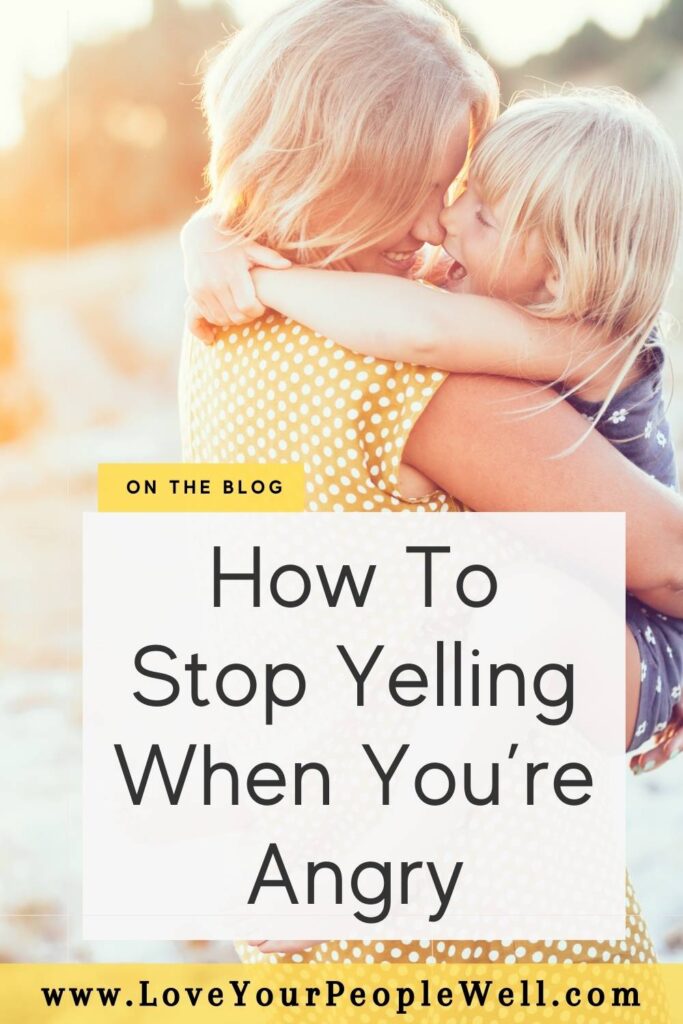Every mom has done it… and every mom wants to stop. Use these 5 quick actions to stop yelling when you’re angry.
We all wonder how to stop yelling when we're angry
No one enjoys feeling angry. And no one wants to yell at their kids!
But emotions can be really overwhelming. We get frustrated, impatient, and upset – and sometimes we find ourselves yelling before we even realize what’s happening.
Mom life is hard. We can’t erase the big emotions. But, we can learn what to do when they come. We can learn how to stop yelling when we’re angry.
[This post may contain affiliate links. If a purchase is made, I may receive a small commission at no extra charge to you.]
Sometimes our kids drive us crazy
Do your kids sometimes drive you crazy? I know that you love them to pieces… but do you sometimes feel like you’re about to break into a million pieces if something doesn’t change?
We all have different triggers. It drives me crazy when my kids pick on each other or my husband forgets to unball his socks when he puts them in the laundry. You might get really irritated by your kids whining or your husband repeatedly forgetting to fill the car with gas.
It makes all the sense in the world that you might get frustrated and angry sometimes. It happens to all of us.
And when the yelling does start, there are 5 quick action steps you can take to stop yelling… even when you’re angry.
5 quick things to do if you want to stop yelling when you're angry
When emotions do overwhelm you and you find yourself yelling at someone, these 5 action steps will help right away. The sooner you start them, the sooner the yelling stops.
Like, for example, if your kids keep interrupting their quiet time to ask you questions, and you find yourself getting annoyed… you can even start these steps before you start yelling in the first place!
(Just saying. Not that it’s happened to me in the last 5 minutes…)
First: STOP.
Just stop. If you notice you’re yelling, stop. In the middle of a sentence if you need to! Step #1 for how to stop yelling when you’re angry is to just stop.
The more you do this step after you’ve started yelling, the sooner you’ll begin to notice that you’re getting frustrated and you can use this step right then – before you start yelling at all.
Next: SLOW DOWN.
After you’ve bit your tongue and you stopped the words, slow yourself down.
Take a few slow deep breaths. (It helps me to close my eyes while I do this if I can.) Slow down your rate of speech and be intentional to speak more slowly.
This gives you more time to get your emotions back under control before the conversation continues, but it will also send a signal to your body that it’s okay to calm down.
Next: STAND DOWN.
Just like a military unit will “stand down” and let themselves relax a bit, you should do the same when you are trying to stop yelling because you’re angry. When you get angry, your muscles tighten. Your body is preparing to fight or flee.
So help your muscles relax – quickly – to remove some tension from the moment. Some of my favorite quick ways to do this are:
- Do a few jumping jacks (and with my toddlers, this usually distracts them into some laughter too – bonus!)
- Use progressive muscle relaxation – tense a muscle group for 10 seconds or so, then quickly release that tension.
- Wiggle/stretch for a moment while I’m standing there in place
- Stomp my feet on the ground quickly… although this definitely depends on where I am!
If you can: SPLASH.
This one might feel a little silly, but if you can step away from the interaction for a moment, it will help. Head to the bathroom (or really, any sink) and splash some cold water on your face.
Not only does this give you a quick break from the person you are yelling at, but it also is a small shock to your system.
You could place an ice cube on the bridge of your nose or lay a washcloth over your eyes, but a quick splash of cold water is probably the easiest.
RELATED: Christian Moms Need To Learn How To Control Anger Too
Finally: SMILE.
You might not feel like it yet, and that’s okay. But after a few slow deep breaths, choose to smile. Sure, you might heavy-sigh while you do it, but make your face smile.
Why? Well, this not only sends a message to your brain that it’s good to calm down – this sends a message to your child (or whomever you are yelling at!) that you are still connected with them.
It’s quick, but it’s relationship-building. Think of it like a little nonverbal way of saying “I’m upset, but I do still love you.”
Listen to Episode #129
Let's connect!
- JOIN MY EMAIL LIST for weekly tips, gospel encouragement, and a new coupon code each month.
- JOIN THE FAITH FIVER CLUB in our Patreon community, to support the ministry and get exclusive access to our private podcast, Q&As, and more.
- JOIN ME ON PINTEREST and on Facebook and Instagram too, for regular encouragement and fun.
And as they say... sharing is caring!
Disclaimers: I am a licensed therapist but my podcast, blog, and resources are not professional or personal advice. I am an affiliate for many of the resources that I link to, and may earn a small commission if you purchase through my link. Read my full disclaimer here.




